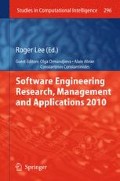Abstract
Recently, there has been a noticeable increase of attention to regulatory compliance. As a result, more and more organizations are required to comply with the laws and regulations that apply to their industry sector. An important aspect of these regulations is directly related to the way by which software systems, used by regulated companies, are built, tested, and maintained. While some of these regulations require from these systems to support a very specific set of requirements, others, the focus of this paper, are concerned with the process by which the system has been built. The Food and Drug Administration (FDA) regulations, for example, impose stringent requirements on the process by which software systems used in medical devices are developed. One particular focus of the FDA regulations is on having a user-centered approach for building software for medical devices through the use of well-known concepts in the area of human factor engineering. In this paper, we discuss these requirements in detail and show how Extreme Programming, an agile process, lacks the necessary practices to support them. We also propose an extension to XP, that if adopted, we believe it will address this particular need of the FDA regulations for medical device software.
Access this chapter
Tax calculation will be finalised at checkout
Purchases are for personal use only
Preview
Unable to display preview. Download preview PDF.
References
Otto, P.N., Antón, A.I.: Addressing legal requirements in requirements engineering. In: Proc. of the Requirements Engineering Conference, pp. 5–14 (2007)
Cugola, G., Ghezzi, C.: Software Processes: a Retrospective and a Path to the Future. In: Proc. of the Software Process Improvement and Practice Conference, pp. 101–123 (1998)
Nerur, S., Mahapatra, R., Mangalaraj, G.: Challenges of migrating to agile methodologies. Communications of the ACM 48(5), 72–78 (2005)
Qasaimeh, M., Mehrfard, H., Hamou-Lhadj, A.: Comparing Agile Software Processes Based on the Software Development Project Requirements. In: Proc. of the International Conference on Innovation in Software Engineering, pp. 49–54 (2008)
Abrahamsson, P., Salo, O., Ronkainen, J., Warsta, J.: Agile Software Development Methods. VTT Publications (2002)
Larman, C.: Agile and iterative development: A manager’s guide. Addison-Wesley, Boston (2003)
Beck, K.: Extreme Programming Explained: Embrace Change, 2nd edn. Addison-Wesley, Reading (2005)
Eclipse Process Framework, XP model Library, http://www.eclipse.org/epf/downloads/xp/xp_downloads.php
FDA Guideline: General Principles of Software Validation; Final Guidance for Industry and FDA Staff (2002), http://www.fda.gov/medicaldevices/deviceregulationandguidance/guidancedocuments/ucm085281.htm
Glossary of Computer Systems Software Development Terminology, http://www.fda.gov/ICECI/Inspections/InspectionGuides/ucm074875.htm
FDA Guideline: Design Control Guidance for Medical Device Manufacturers (1997), http://www.fda.gov/downloads/MedicalDevices/DeviceRegulationandGuidance/GuidanceDocuments/UCM070642.pdf
FDA Guideline: Do It by Design: An Introduction to Human Factors in Medical Devices (1996), http://www.fda.gov/downloads/MedicalDevices/DeviceRegulationandGuidance/GuidanceDocuments/UCM095061.pdf
FDA Guideline: Medical Device Use-Safety: Incorporating Human Factors Engineering into Risk Management (2000), http://www.fda.gov/downloads/MedicalDevices/DeviceRegulationandGuidance/GuidanceDocuments/ucm094461.pdf
Boehm, B., Turner, R.: Balancing Agility and Discipline: A Guide for the Perplexed, pp. 26–37. Addison Wesley Professional, Reading (2003)
Nielsen, J.: Usability Engineering. Academic Press, Boston (1993)
Holzinger, A.: Usability Engineering Methods for Software Developers. Communications of the ACM 48(1), 71–74 (2005)
Folmer, E., Bosch, J.: Architecting for Usability; a Survey. The Journal of Systems & Software 70(1), 61–78 (2004)
Folmer, E., van Gurp, J., Bosch, J.: Software Architecture Analysis of Usability. LNCS, pp. 38–58. Springer, Heidelberg (2005)
Lee, J.C., McCrickard, S.: Towards Extreme(ly) Usable Software: Exploring Tensions between Usability and Agile Software Development. In: Proc. of Agile Conference, pp. 59–71 (2007)
Nord, R.L., Tomayko, J.E., Wojcik, R.: Integrating Software-Architecture-Centric Methods into Extreme Programming (XP) Technical Note, CMU/SEI (2004)
Constantine, L.L., Lockwood, L.A.D.: Software for Use: A Practical Guide to the Models and Methods of Usage-Centered Design. Addison-Wesley, Reading (1999)
Obendorf, H., Schmolitzky, A., Finck, M.: XPnUE – Defining and Teaching a Fusion of eXtreme Programming and Usability Engineering. In: Proc. of HCI Educators Workshop, inventively: Teaching theory, design and innovation in HCI (2006)
Obendorf, H., Finck, M.: Scenario-Based Usability Engineering Techniques in Agile Development Processes. In: Proc. of the International Conference on Human Factors in Computing Systems, pp. 2159–2166 (2008)
Rosson, M.B., Carroll, J.M.: Usability Engineering: Scenario-based Development of Human-Computer Interaction. Morgan Kaufmann, San Francisco (2001)
McCaffery, F., McFall, D., Donnelly, P., Wilkie, F.G., Sterritt, R.: A software process improvement lifecycle framework for the medical device industry. In: Proc. of the 12th IEEE International Conference and Workshops on Engineering of Computer-Based Systems, pp. 273–280 (2005)
McCaffery, F., Donnelly, P., McFall, D., Wilkie, F.G.: Software Process Improvement for Medical Industry. Studies in Health Technology and Informatics, pp. 117–124. IOS Press, Amsterdam (2005)
Wright, G.: Achieving ISO 9001 Certification for an XP Company. In: Proc. of Extreme Programming and Agile Methods - XP/Agile Universe 2003, pp. 43–50 (2003)
The International Standard for Quality Management, ISO, http://www.isoqarinc.com/ISO-9001-Quality-Management-Standard.aspx
Author information
Authors and Affiliations
Editor information
Editors and Affiliations
Rights and permissions
Copyright information
© 2010 Springer-Verlag Berlin Heidelberg
About this chapter
Cite this chapter
Mehrfard, H., Pirzadeh, H., Hamou-Lhadj, A. (2010). Investigating the Capability of Agile Processes to Support Life-Science Regulations: The Case of XP and FDA Regulations with a Focus on Human Factor Requirements. In: Lee, R., Ormandjieva, O., Abran, A., Constantinides, C. (eds) Software Engineering Research, Management and Applications 2010. Studies in Computational Intelligence, vol 296. Springer, Berlin, Heidelberg. https://doi.org/10.1007/978-3-642-13273-5_16
Download citation
DOI: https://doi.org/10.1007/978-3-642-13273-5_16
Publisher Name: Springer, Berlin, Heidelberg
Print ISBN: 978-3-642-13272-8
Online ISBN: 978-3-642-13273-5
eBook Packages: EngineeringEngineering (R0)

